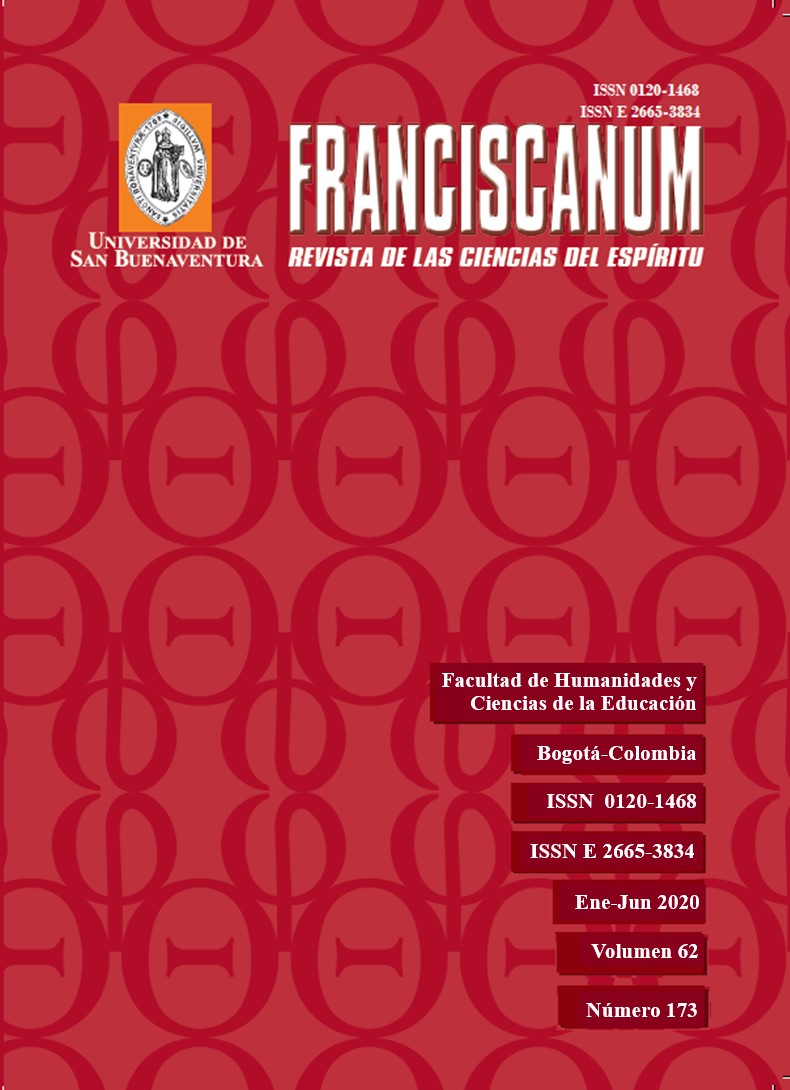This journal provides immediate open access to its content, based on the principle that giving the public free access to research helps a greater global exchange of knowledge.
Therefore, the Creative Commons 4.0 Attribution Attribution - Equal Share (by-sa) License is accepted: The commercial use of the work and the possible derived works is permitted, the distribution of which must be done with a license equal to that regulates the original work.
http://creativecommons.org/licenses/by-sa/4.0/
Along these same lines and in line with the Open Access policy, it is clarified that the authors maintain their rights to articles, without restrictions and, in the same way, they maintain their publication rights, without restrictions. They are only asked to reference the number of the Franciscanum magazine where the article initially appeared.
Abstract
We describe the epistemological rupture between modern rationality and postmodern rationality, regarding the religious experience and the event of subjectivity from the thought of Carlos Mendoza Álvarez. If the conception of the autonomous subject implied the negation of otherness and the abandonment of the metaphors of transcendence for salvation, the irruption of postmodern subjectivity marks the impossibility of conceiving humanity outside of reconnection with the other and with transcendence. In this context, the phenomenon of the return of the religious emerges as a sign of postmodern times: a sign of re-enchantment of culture and openness to the other order of existence. It is the opportunity to rehabilitate the experience with the transcendent Mystery of the real, cultivated by all the religious traditions, which in monotheistic language we call God.
References
Caldeira, Cleusa. «Dá Europa à América Latina. A vulnerabilidade como locus theologicus». Revista Perspectiva Teológica 2, Vol. 50 (2018): 307-323.
Caldeira, Cleusa. «Desconstrução do cristianismo. Imperativo ontológico à experiência de Deus». Revista Horizonte 51, Vol. 16 (2018): 1270-1299.
Caldeira, Cleusa «Fundamentos teológicos da política. Reabilitação da fonte política da
subjetividade em tempos pós-modernos». REVER 3, Vol. 18 (2018):141-159.
Caldeira, Cleusa. «Teologia e niilismo pós-moderno: a subjetividade vulnerável como locus theologicus no pensamento de Carlos Mendoza Álvarez». Revista Pistis & Práxis 3, Vol. 9 (2017): 810-838.
Corbí, Marià. Para uma espiritualidade leiga: sem crenças, sem religiões, sem deuses. São Paulo: Paulus, 2010.
Corbí, Mariano. Religión sin religión. Madrid: PPC, 1996.
Duque, João Manuel. Dizer Deus na pós-modernidade. Lisboa: Alcalá, 2003.
Duque, João Manuel. «Experiência religiosa e Metafísica: breve leitura de Jean-Luc Marion». In Religiosidade. O seu carácter irrepetível. Perspectivas contemporâneas, editado por Manuel G. Sumares, Helena B. Catalão y Pedro M.D. Valinho Gomes, 57-68. Lisboa: ALETHEIA, 2010.
Lenaers, Roger. Outro cristianismo é possível. A fé em linguagem moderna. São Paulo: Paulus, 2010.
Lenaers, Roger. Viver em Deus sem Deus? São Paulo: Paulus, 2014.
Mendoza Álvarez, Carlos. Deus ineffabilis. Una teología posmoderna de la revelación del fin de los tempos. Barcelona: Herder, 2015.
Mendoza Álvarez, Carlos. Deus liberans. La revelación cristiana en diálogo con la modernidad. Los elementos fundacionales de la estética teológica. Fribourg: Éditions Universitaires, 1996.
Mendoza Álvarez, Carlos. «Dios en los escombros del espacio público posmoderno». In El espacio público y la Ciudad de Dios: un problema interdisciplinario, editado por Carlos Mendoza Álvarezs, 211-231. México: Universidad Iberoamericana, 2011.
Mendoza Álvarez, Carlos. «Dios es inútil. Por una desconstrucción de las imágenes de Dios». In Imágenes de Dios en el mundo contemporâneo, editado por Jorge Heredia e Geogina Zubiria, 15-52. México: UITCAM, 2007.
Mendoza Álvarez, Carlos. «El diálogo fe y razón en contexto de globalización». Revista Piezas en diálogo. Filosofía y ciencias humanas 8 (2009): 7-24.
Mendoza Álvarez, Carlos. El Dios escondido de la posmodernidad. Deseo, memoria e imaginación escatológica. Ensayo de teología fundamental posmoderna. Guadalajara: SUJ, 2010.
Mendoza Álvarez, Carlos. El Dios otro. Un acercamiento a lo sagrado en el mundo posmoderno. México: Universidad Iberoamericana, 2003.
Mendoza Álvarez, Carlos. «Entre el bufón, la esfinge y el staretz. El lenguaje de la fe en la cultura mediática». Revista Efemérides Mexicana 86 (2011): 177-196.
Mendoza Álvarez, Carlos. «Entre nihilismo y vuelta al fundamento». In ¿Cristianismo posmoderno o postsecular? Por una interpretación teológica de la modernidad tardía, editado por Carlos Mendoza Álvarez, 17-36. México: Universidad Iberoamericana, 2008.
Mendoza Álvarez, Carlos. «Heidegger y la teología posmoderna. Diálogo en torno a la situación histórica del tiempo kairológico». Pistis & Praxis 2 (2016): 337-365.
Mendoza Álvarez, Carlos. «La crisis de la religión en las sociedades posmodernas». Revista de la Universidad Iberoamericana 3 (2009):14-16.
Mendoza Álvarez, Carlos. «Sobre el rebasamiento del cristianismo como totalidad». In La universidad de inspiración cristiana en tiempos de poscristiandad, editado por Carlos Mendoza Álvarez, 41-55. México: Universidad Iberoamericana, 2007.
Nancy, Jean-Luc. L’adoration : déconstruction du christianismo, 2. Paris: Galilée, 2010. Nancy, Jean-Luc. La déclosion: déconstruction du christianisme, 1. Paris: Galilée, 2005.




















